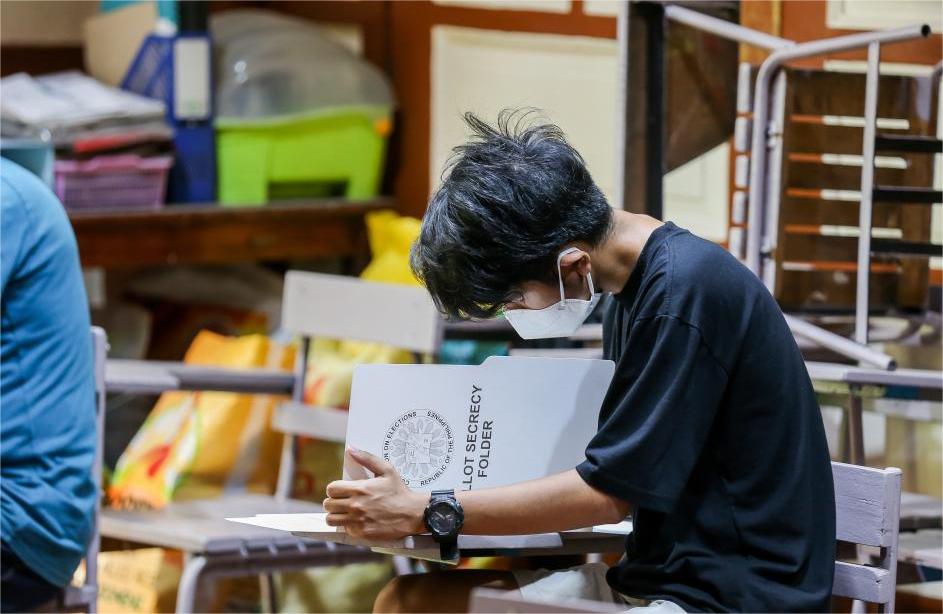Good, that 73 percent of Filipino voters won't support or vote for pro-China candidates in the midterm polls, after seeing how China has been invading, encroaching and bullying our fishermen and government men over its claims in the West Philippines and the crimes (including espionage) of Chinese businessmen in the POGO operations.
People now view the aggressiveness and invasive attempts of China Coast Guard as provoking the Philippines to armed conflict (which China is certain it would win because of its well-armed and well-oiled defense machinery) as it continues to ignore the rule of law in the WPS.
Pinoys are now wary and suspicious of politicians who endear themselves with the Asian powerhouse regardless of consequences of such friendship and ties with China.
The Pulse Asia survey commissioned by think tank, Stratbase ADR institute, showed 73 percent of Filipinos stating they would not support or vote for pro-China candidates, while five percent said they would support such candidates. About 23 percent of Filipinos said they were undecided.
Issue of sovereignty
“Many Filipinos feel that China’s actions, particularly in the West Philippine Sea, directly challenge our sovereignty and undermine our nation’s interests,” Victor Andres Manhit, the Stratbase ADR presiden, said in a statement quoted by Business World.
“This prevailing view is driven by both patriotic sentiment and a desire for leaders who will prioritize the Philippines’ long-term security and prosperity,” he added.
He said electing pro-China candidates could lead to policies compromising Manila’s sea claims and economic interests.It was during President Duterte's time that China's invasive stance heightened and the then president is now running for senator, along with his allies, family members and relatives.
Only 1 percent of Filipinos see China as a trusted partner in national development, while 79 percent saw the United States as the Philippines’ most trusted development partner, according to the poll. About half of Filipinos said Japan is Manila’s top ally.
'Beneficial' allies
About seven percent of Filipinos said China is a beneficial economic partner for the Philippines, while 66 percent backed the US as the country’s top economic partner, followed by Japan with 43 percent, Australia with 32 percent and Canada with 31 percent, Business World said.
“These countries have proven to be dependable allies, not only in ensuring regional stability but also in fostering economic growth,” Manhit said.
Based on a July Social Weather Stations (SWS) poll commissioned by Stratbase, 60 percent of Filipinos said measures including joint patrols and military exercises with “allies, friends and partners” were enough in dealing with the Southeast Asian nation’s sea dispute with China.
A word of caution
But, “the Pinoy voter is notoriously known to decide only a few days before election day,” Michael Henry Yusingco, a senior research fellow at the Ateneo Policy Center, said adding that the anti-China sentiment can still change.”
“These results seem to suggest that Beijing’s effort to win the hearts and minds of Pinoys is failing.”
He said candidates this year would likely use the poll to stir anti-China sound bites and slogans, but are unlikely to offer sound national security solutions.
President Ferdinand "Bongbong" Marcos, Jr. last week pressed Southeast Asian leaders and China at a regional summit to speed up negotiations on a code of conduct for the South China Sea, while accusing Beijing of harassment and intimidation.
A 2016 arbitral ruling that voided China’s claims in the South China Sea said Scarborough shoal is a traditional fishing ground for Filipino, Chinese and Vietnamese fishermen. China has controlled the shoal since 2012.
The Philippines has been unable to enforce the ruling and has since filed hundreds of protests over what it calls encroachment and harassment by China’s coast guard and its vast fishing fleet.
Maria Ela Atienza, who teaches political science at the University of the Philippines, said the worsening tensions with China and allegations of espionage and crimes involving Chinese operators of online gambling operations in the Philippines have made these anti-China sentiments more apparent.
“We should not underestimate those forwarding Chinese interests as they may have a lot of resources that can affect the campaign and eventually the results of the elections,” she said.
#WeTakeAStand #OpinYon #OpinYonNews #Election2025 #PHNationalAndLocalElection

